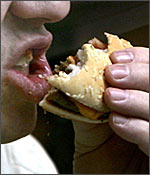If you're past the age of 20, then trying to shed those extra pounds with gruelling exercises and strict diets may not do you any good. According to a new study, during adulthood, our bodies tightly regulate the number of fat cells we have acquired by the age we reach 20.
The finding is particularly important for obese people, who researchers say, can have twice as many fat cells as their lean counterparts.
The finding also suggests that obesity in adulthood is at least partly determined by diet and exercise in childhood.
To determine the age of fat cells in 35 subjects, researchers focused on a marker found in fat cells -- radioactive carbon from above-ground nuclear bomb tests in the 1950s and '60s.
More of a naturally-occurring but rare type of carbon, called carbon-14, was produced during the testing.
Bruce Buchholz, a chemist at Lawrence Livermore National Laboratory in Livermore, California, explained how his team used this marker to make their discovery.
Our bodies incorporate carbon-14 from the food we eat, along with the vastly more abundant types called carbon-12 and 13. Since carbon-14 from the testing is decreasing with time as it mixes with the oceans, the amount of rare carbon-14 that a cell has taken up is like a timestamp for when the cell formed, Buchholz said.
The researchers knew that cells were dying and being replaced over time, because people born before the nuclear testing had fat cells that were created after the testing. The scientists also found that about 10 percent of fat cells were replaced every year whether or not a person was obese.
Despite that replacement rate, another aspect of the study with a larger sample of people revealed that the total number of fat cells per person remained relatively constant over time. Even extreme weight-loss strategies, such as bariatric surgery, did not reduce the number of fat cells in study subjects.
The tightly regulated number of fat cells in adulthood may explain why it seems easy to gain back lost weight, Buchholz said.
"If you already have more fat cells from adolescence than other people, it's harder to become thin," Live Science quoted Buchholz, as saying.
The study is published in an online issue of the journal Nature.
Photograph: Getty Images
